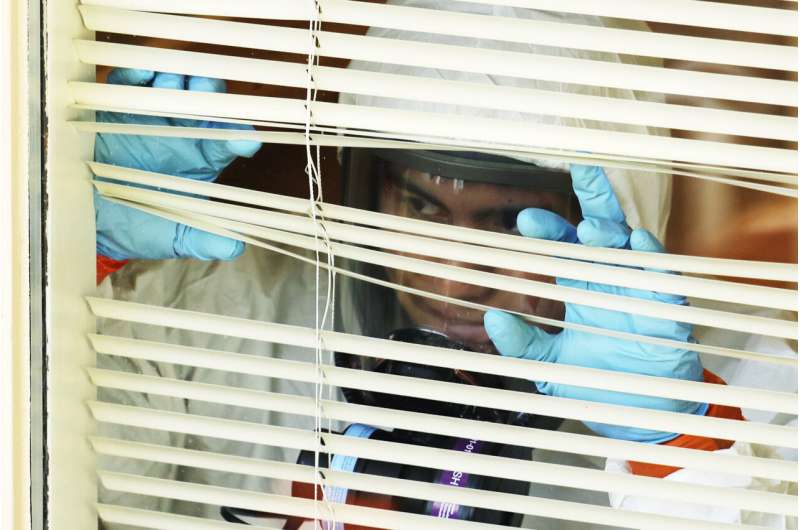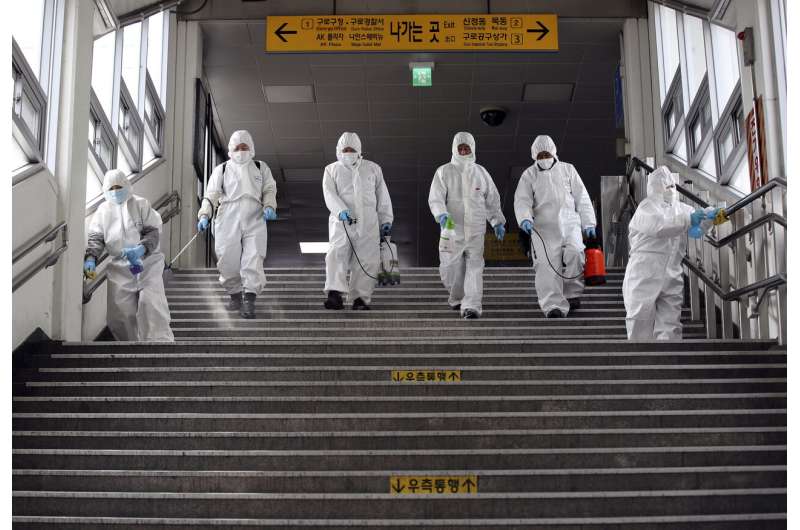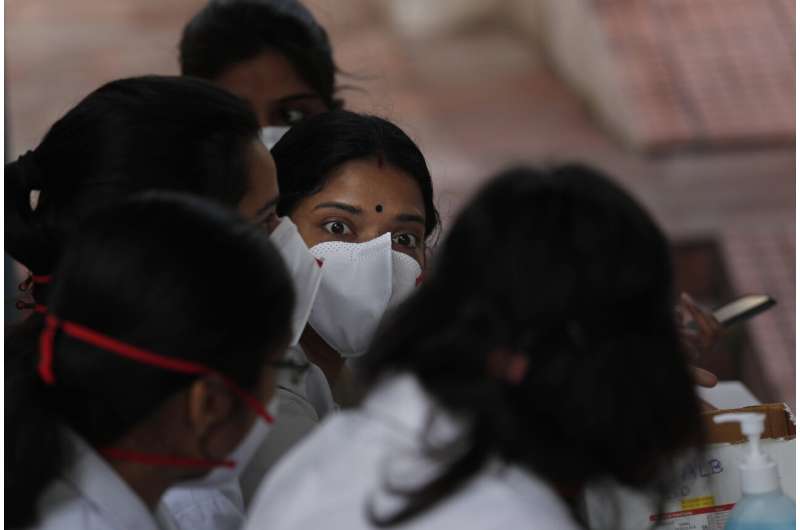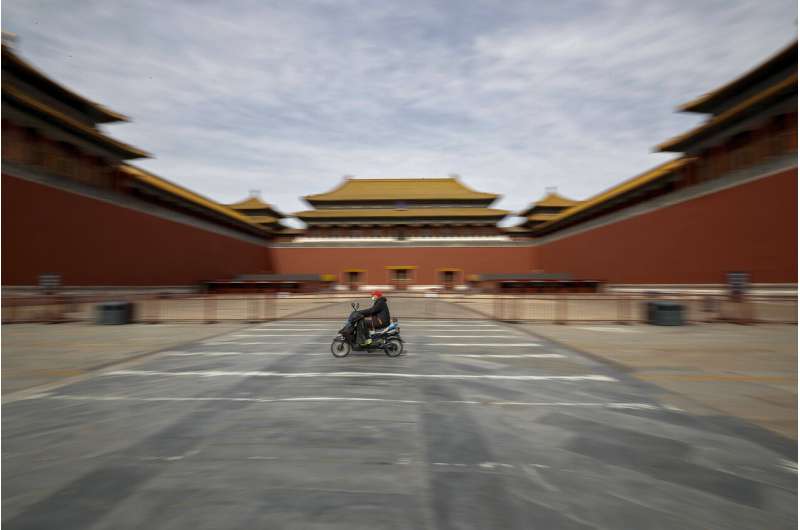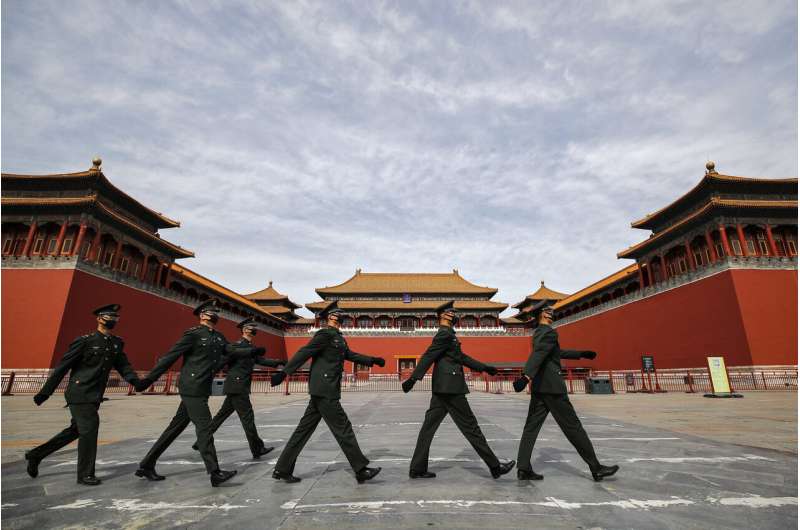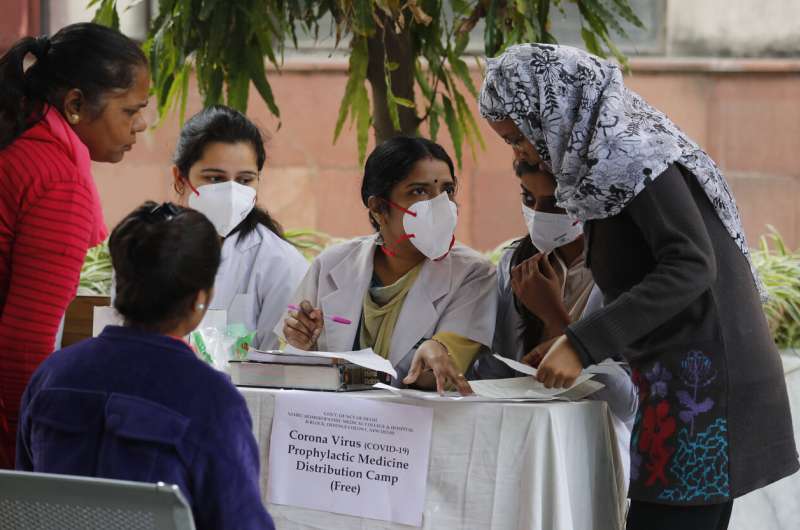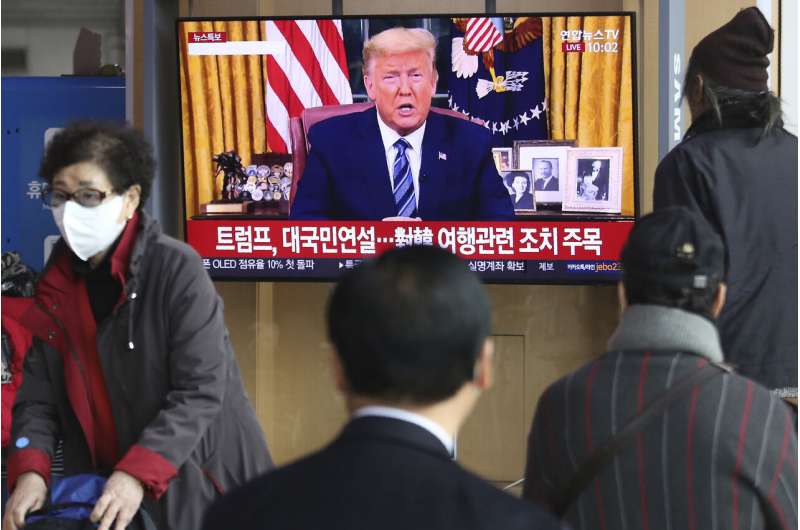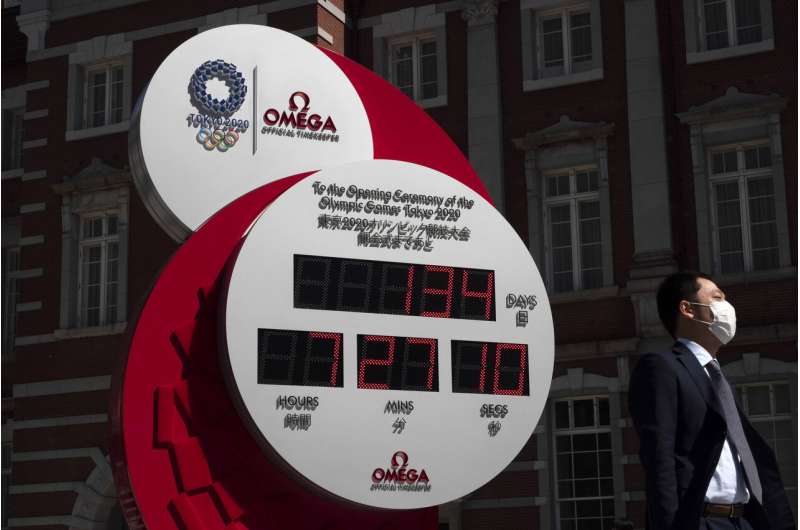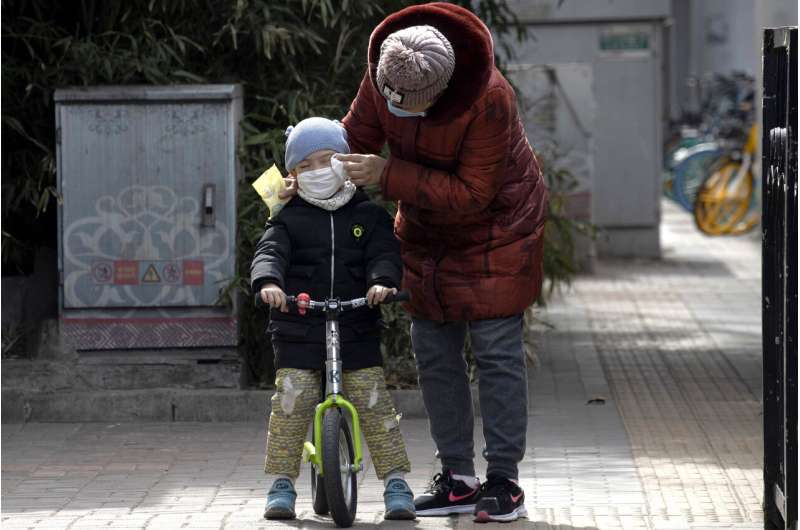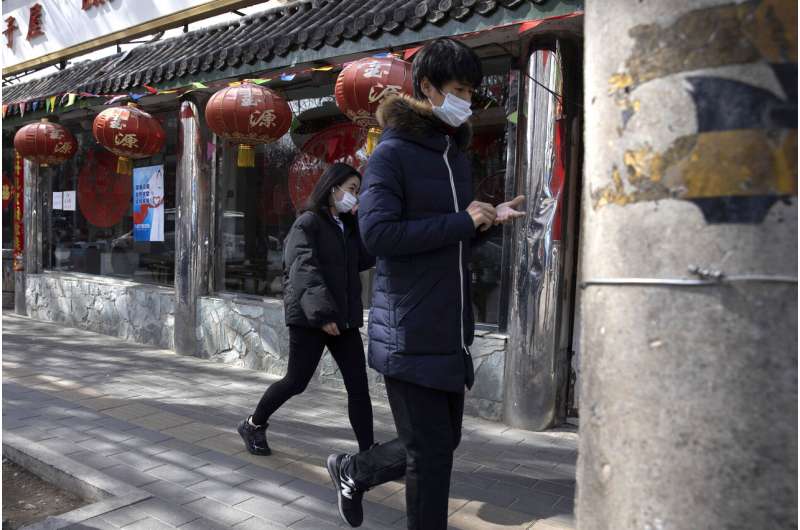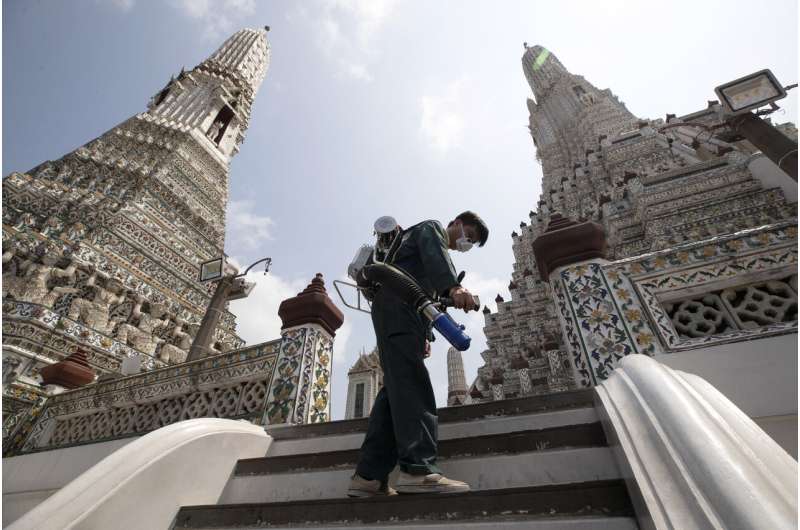A worker from a Servpro disaster recovery team wearing a protective suit and respirator peers out a window as he waits to exit the Life Care Center in Kirkland, Wash. for a break from cleaning the facility, Wednesday, March 11, 2020. The nursing home is at the center of the coronavirus outbreak in Washington state. For most people, the virus causes only mild or moderate symptoms. For some it can cause more severe illness, especially in older adults and people with existing health problems. (AP Photo/Ted S. Warren)
People around the world became increasingly closed off from one another Thursday as sweeping travel bans accelerated, walling regions apart as a viral pandemic unfolds and financial markets plunge.
It was an outbreak moving, at once, both glacially and explosively, with a virus first detected three months ago in China creeping across borders and producing eruptive outbreaks that have crippled areas.
Even for a crisis that has brought no shortage of headlines, dizzying developments were flashing across screens: An official designation of "pandemic" from the World Health Organization, a dramatic halt to much travel between the United States and 26 European countries, and infections among beloved Hollywood stars, sports luminaries and political leaders. All of it came against a backdrop of plunging world economies that left not only Wall Street investors but people from all walks of life hurting.
"We will see more cases and things will get worse than they are right now," said Dr. Anthony Fauci, director of the U.S. National Institute of Allergy and Infectious Diseases.
President Donald Trump, who had downplayed the virus for days, suddenly struck a different tone, delivering a somber Oval Office address announcing strict rules on travel from much of Europe to begin this weekend. The State Department followed with an extraordinary warning to Americans to "reconsider travel abroad" too. Local leaders warned things would only get worse.
Workers wearing protective suits spray disinfectant as a precaution against the new coronavirus at a subway station in Seoul, South Korea, Thursday, March 12, 2020. For most people, the new coronavirus causes only mild or moderate symptoms, such as fever and cough. For some, especially older adults and people with existing health problems, it can cause more severe illness, including pneumonia.(Park Dong-joo/Yonhap via AP)
"This will be a very difficult time," said Dr. Jeff Duchin a top public health official for the Seattle area, which has one of the biggest U.S. outbreaks. "It's similar to what you might think of as an infectious disease equivalent of a major earthquake that's going to shake us for weeks and weeks."
Across the U.S., where cases now number more than 1,300, a sense of urgency was pervasive.
Nursing homes turned away visitors, schools emptied of students and workplace cubicles went vacant. A rite of spring, college basketball's March Madness, was set to proceed in empty arenas, while professional basketball won't play at all. Joyous, booze-filled, green-splashed celebrations of St. Patrick's Day were called off. TV shows taped without audiences, rush-hour crowds in New York subway cars disappeared, and families hunkered down wondering what would come next.
Indian doctors wearing masks at a clinic where they provide free homeopathy medicine for prevention of COVID-19 at a government run homeopathic hospital in New Delhi, India, Thursday, March 12, 2020. The vast majority of people recover from the new coronavirus. According to the World Health Organization, most people recover in about two to six weeks, depending on the severity of the illness. The camp is part of the government's surveillance for fever and other symptoms related to the new virus. (AP Photo/Manish Swarup)
"If we avoid each other and listen to the scientists, maybe in a few weeks it will be better," said Koloud 'Kay' Tarapolsi of Redmond, Washington, who has two children whose schools were being closed beginning Thursday.
As the pandemic grips Europe and the U.S., it continues to ebb in China, where the first cases of COVID-19 emerged in December. It reported a record low of just 15 new cases Thursday and was cautiously monitoring new arrivals who were returning with the virus from elsewhere.
More than three-fourths of China's patients have recovered. Most people have only mild or moderate symptoms, such as fever and cough, though symptoms can be severe, including pneumonia, especially in older adults and people with existing health problems. Recovery for mild cases takes about two weeks, while more severe illness may take three to six weeks, WHO says.
A man rides on an electric-powered scooter passes by the closed entrance gates to the Forbidden City, usually crowded with tourists before the new coronavirus outbreak in Beijing, Thursday, March 12, 2020. For most people, the new coronavirus causes only mild or moderate symptoms. For some it can cause more severe illness.(AP Photo/Andy Wong)
More than 126,000 people in more than 110 countries have been infected. But WHO emphasized the vast majority are in just four countries: China and South Korea—where new cases are declining—and Iran and Italy, where they are not.
"We have called every day for countries to take urgent and aggressive action," said WHO's leader, Tedros Adhanom Ghebreyesus. "We have rung the alarm bell loud and clear."
High-profile announcements of infections made the alarms even louder. Double Oscar winner Tom Hanks said he and his wife Rita Wilson tested positive. Australian officials say the couple are in a Queensland hospital and their close contacts would have to self-quarantine.
In Italy, soccer club Juventus said defender Daniele Rugani tested positive. In Iran, the senior vice president and two other Cabinet ministers were reported to have been diagnosed with COVID-19.
-
Soldiers wearing protective face masks march past the closed entrance gates to the Forbidden City, usually crowded with tourists before the new coronavirus outbreak in Beijing, Thursday, March 12, 2020. For most people, the new coronavirus causes only mild or moderate symptoms, such as fever and cough. For some, especially older adults and people with existing health problems, it can cause more severe illness, including pneumonia. (AP Photo/Andy Wong)
-
Indian doctors fill in the details of people before giving free homeopathy medicine for prevention of COVID-19 at a government run homeopathic hospital in New Delhi, India, Thursday, March 12, 2020. The vast majority of people recover from the new coronavirus. According to the World Health Organization, most people recover in about two to six weeks, depending on the severity of the illness. The camp is part of the government's surveillance for fever and other symptoms related to the new virus. (AP Photo/Manish Swarup)
-
People watch a TV screen showing a live broadcast of U.S. President Donald Trump's speech at the Seoul Railway Station in Seoul, South Korea, Thursday, March 12, 2020. Trump announced he is cutting off travel from Europe to the U.S. and moving to ease the economic cost of a viral pandemic that is roiling global financial markets and disrupting the daily lives of Americans. The Korean letters read: "Trump national speech." (AP Photo/Ahn Young-joon)
-
In this March 11, 2020, photo provided by the Malacanang Presidential Photographers Division, President Rodrigo Duterte, left, discusses matters with Ambassador of the People's Republic of China to the Philippines Huang Xilian, right, during a courtesy call at the Malacanang Presidential Palace in Manila, Philppines. Philippine President would be tested for the new coronavirus Thursday after he met Cabinet officials who were exposed to infected people and have now self-quarantined, official said. (Robinson Ninal Jr./Malacanang Presidential Photographers Division via AP)
-
A man with a mask walks past a countdown clock for the Tokyo 2020 Olympics Thursday, March 12, 2020, in Tokyo. The Tokyo Olympics are being threatened by the spreading coronavirus. Organizers and the International Olympic Committee have repeatedly said the games will open on July 24 as planned, with the Paralympics opening on Aug. 25. For most people, the new coronavirus causes only mild or moderate symptoms. For some it can cause more severe illness. (AP Photo/Jae C. Hong)
-
A woman wipes the face of a child on the streets of Beijing on Thursday, March 12, 2020. For most people, the new coronavirus causes only mild or moderate symptoms. For some it can cause more severe illness, especially in older adults and people with existing health problems. (AP Photo/Ng Han Guan)
-
Residents wearing masks walk past a restaurant in Beijing on Thursday, March 12, 2020. For most people, the new coronavirus causes only mild or moderate symptoms. For some it can cause more severe illness, especially in older adults and people with existing health problems. (AP Photo/Ng Han Guan)
-
President Donald Trump speaks in an address to the nation from the Oval Office at the White House about the coronavirus Wednesday, March, 11, 2020, in Washington. (Doug Mills/The New York Times via AP, Pool)
-
A worker sprays disinfectant at Temple of Dawn in Bangkok, Thailand, Thursday, March 12, 2020. For most people, the new coronavirus causes only mild or moderate symptoms. For some it can cause more severe illness. (AP Photo/Sakchai Lalit)
Italy, already under unprecedented restrictions, tightened rules even more. Italian Premier Giuseppe Conte announcing the closure of pubs, restaurants, hair salons, cafeterias and other businesses that can't ensure a meter (yard) of space between workers and customers.
"In this moment, all the world is looking at us," Conte said, as the rules brought an eerie hush to places around Italy.
Asian shares plunged Thursday, following a drop of 1,464 points of the Dow Jones Industrial Average, putting the index 20% below its record set last month and into fearsome territory Wall Street calls a "bear market."
"There's a real feeling that we don't know where this ends," said Brad McMillan, chief investment officer for Commonwealth Financial Network.
© 2020 The Associated Press. All rights reserved. This material may not be published, broadcast, rewritten or redistributed without permission.
